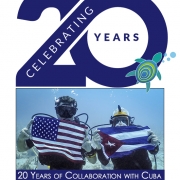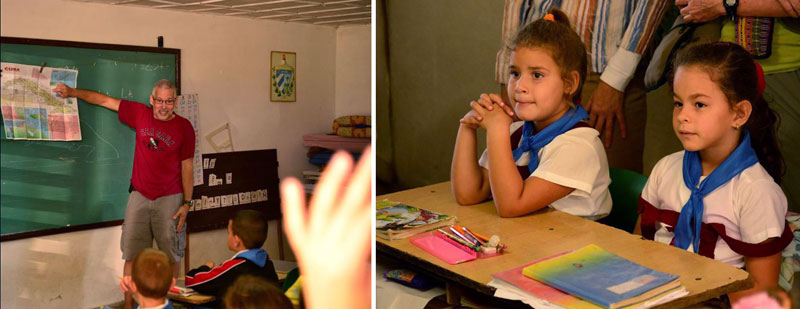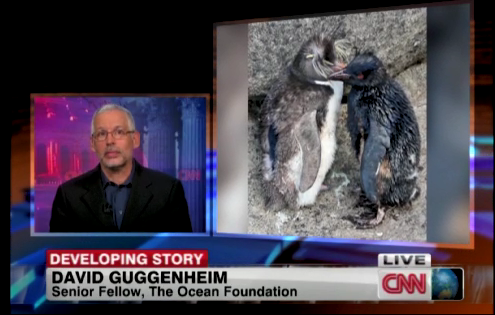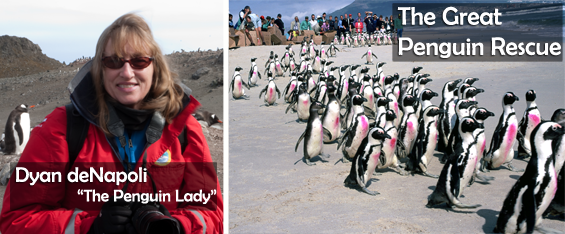Cuba Could Be Impacted by Gulf Oil Spill
For the most up-to-date information on the BP Deepwater Horizon oil spill’s potential impacts on Cuba, please visit our special “Cuba at Risk” page.
Since its discovery of oil and natural gas reserves in the Florida straits, Cuba’s preparations for full-scale offshore oil and gas development has raised alarm in the United States, particularly in Florida where it is estimated that much of a catastrophic spill originating in Cuba would be swept by Gulf currents. Ironically, it is now Cuba that faces the threat of a massive oil spill by the United States. The disastrous oil spill from the BP Deepwater Horizon now threatens Cuba, the largest and most biologically diverse island in the Caribbean, due to those same Gulf currents. To make matters worse, the economic embargo imposed upon Cuba by the United States decades ago makes collaboration and coordination exceedingly difficult during this crisis.

Research area in Cuba’s Gulf of Mexico waters
For the past decade we have been working with our colleagues at the University of Havana’s Center for Marine Research (Centro de Investigaciones Marinas, CIM) to conduct research and conservation projects in Cuba’s coastal areas. Since 2002, our work has focused in Cuba’s Gulf of Mexico waters where CIM has been conducting the first-ever comprehensive studies of this little-known area. What we are learning is that this region is incredibly rich with healthy corals, fish and serves as critical habitat for imperiled species such as sea turtles, manatees and sharks.
The catastrophic oil spill in the Gulf of Mexico from the BP Deepwater Horizon presents a potentially grave and unprecedented threat to Cuba’s marine life and coastal areas. Not only would this be devastating to Cuba’s marine life, but given the biological connections present in the Gulf of Mexico, such an impact could affect a myriad of species, including fish, sea turtles, dolphins, manatees, sharks, corals inhabiting the waters of the U.S., Mexico and beyond. Currents carry fish larvae from Cuba into U.S. waters, making protection of Cuba’s coastal ecosystems vital to the health of U.S. fish populations.
The primary risk to Cuba comes from the trajectory of the “Loop Current,” a prominent but very variable feature of the Gulf of Mexico. Should the oil become swept up by the swift Loop Current, it could end up in Cuban waters within a matter of days, impacting coastal areas still recovering from the impacts of 2008 hurricanes, Gustav and Ike.
In 2007, a trinational collaboration was formed among the three countries bordering the Gulf of Mexico (Cuba, Mexico and the United States) to elevate collaboration in marine research and conservation to a new level. Sharing of information is central in this collaboration and since the scope of this disaster became evident, our collaboration has mobilized in order to provide our Cuban colleagues with the best information possible in order to plan for potential impacts and deal with them should they occur. A related page on this site has been set up for the purpose of sharing detailed information, including technical reports and satellite imagery and interpretation.
[youtube EdapdU_Ph3w]
Learn More:
A Blueprint of Collaboration — and Friendship — With Cuba
Expedition to Cuba’s Gulf of Mexico
Blog Post: OMG, I Thought You Were Dead!
Blog Post: Cuba Loses Its Mother Ocean
Blog Post: Can Cuba’s Mysteries Help Save the World’s Coral Reefs?









It is a sad thing to see that the greed of a large oil company can impact the lives of a beautiful place like CUBA I am Canadian and feel that the u.s. government should hault all future drilling anywhere off shore. I pray that the spill will keep away from your beautiful coast. If there is any way we can help, please let me know. may God Look After You.
ken
The evils of big industry controlling federal safety regulations with $$ through placing key decision and policy makers in Washington. We can all talk about the Iran regime when the puppet US government is run by big industry policy makers.
In the end, mother nature will rule. She always has the upper hand. Only time will tell.
This comment is directed at Ken as well as all other Canadians and people interested in trying to salvage the environment: CANADA IS DOING EVEN WORSE THINGS TO THE ENVIRONMENT!
Canada is preparing to drill the deepest rig that has ever been drilled before off the eastern seaboard. Analogous to the talks of BP prior to its rig failing, the oil companies and lobbyists who are pushing to get this rig going are engaging the same discourse: it’s safe, nothing can fail.
Oil companies will continue to push forth until consumers change their demand, and put pressure on governments to cut their ties with oil corporationgs.
Nonetheless, the change begins with oneself: “My life is my message” (Ghandi).
It is just blasphamy the greed that is rampant in America… how will Cuba respond to this crisis. Will the USA ease some of the burden by lifting the embargo? The American people need to start raising their voices against a lot of the wrong doing going on in this country or one day they will awake and find their freedoms has been taken away…..it’s sooner thhan we think. THE GREED IS JUST RAMPANT AND NOT ONLY DOES THE POOR HAS TO PAY BUT NOE THE ANIMALS AND PLANET AS A WHOLE…..GOD SAVE US FROM THESE WICKED ,EVIL MEN!
People should leave nationalism behind. Transnational corporations like BP (British Petroleum/”Beyond Petroleum”) and the global banks OWN the various national governments including, quite obviously, that of USA. This is why you see private energy and mineral giants using public money to steal resources in Iraq and Afghanistan. This is also why off-shore drilling generates pure profits for shareholders. Any attempts at cleaning up the horrific pollution will be wholly financed by working class USA taxpayers. Why do average folks tolerate this?
If we donate, how do we know the money doesn’t go straight into Castro’s pocket? We want very much to help protect Cuba’s particularly special undersea environment, but we understand that all money is under Castro’s control. Are you providing cash to your colleagues, supplies, or what? I know we are one planet and one ocean, but we want our money to go TO the ocean in this particular case. Thanks for all that you do despite international politics to save our oceans.
Curious – Thanks for your question…a good one.
We’ve been working with our colleagues in Cuba over the past decade under a license from the U.S. Treasury Department’s Office of Foreign Assets Control (OFAC) which must approve and review all of our expenditures. We go through a similar process on the Cuban side with the Cuban Ministry of Foreign Investment where we must get approval before initiating a project.
Our funds go primarily toward chartering vessels for research, purchase of some equipment (scientific equipment, camping and scuba gear) used in field work, travel for meetings and workshops, and for salaries of our US team (we don’t pay any Cuban salaries). Field work, especially ship time, is a valuable commodity in Cuba because it is too costly for many Cuban institutions, so our joint expeditions are making a difference, not only for science, but for roughly 20 Cuban graduate students who have or are currently basing their graduate theses on the research conducted during these projects.
Bottom line: Our funds are spent on research and conservation activities and nothing else, and our Cuban partners manage these funds responsibly. There are many checks and balances in the system to ensure that funds go to the right place. Working in Cuba is very difficult, but once all the paperwork is done and we get to work, the results are very meaningful.